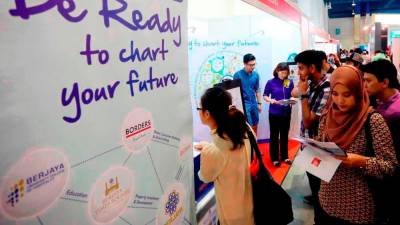Be aware of technological advancements, learn new skills and retrain to ensure employability, says expert.
KUALA LUMPUR: With the rapid advancement of automation, the nature of work in many sectors has been significantly transformed. As a result, jobseekers are now worried over concerns about unemployment and a potential decrease in job opportunities.
Junior graphic designer Sin Kian Tan, 26, said: “I fear being replaced by machines or software as automation has the potential to eliminate certain jobs, especially those that involve repetition and manual tasks.
“This has created a sense of insecurity among individuals like me, who work in such fields. We worry about the stability and permanence of our employment and the relevance of our existing skills.
“Even many multinational companies in the country have started to use artificial intelligence due to its efficiency and cost effectiveness. This could lead businesses to opt for automated solutions over human labour.”
However, human capital management expert Presana Kalaiselvan said while automation has emerged as a defining trend that is reshaping industries across the country, it is important to recognise that it does not always lead to job losses.
“According to the latest Statistics Department employment figures for the first quarter of this year, the job vacancy rate stands at 2.2%, with a total of 1,926,000 job vacancies.
“This is slightly higher than the number recorded in the first quarter of last year, which was 1,843,000. It means there is currently a higher demand for human labour in the country.
“As a recruiter, I can say that jobseekers with lower skill sets will face challenges in getting jobs in industries that can be automated.”
Presana, who specialises in talent attraction and acquisition, said job seekers need to be aware of technological advancements.
She said new industries and sectors are emerging and creating demand for skilled professionals.
She added that jobseekers should adapt their skills and retrain for positions that are emerging due to automation.
Presana said automation has improved working conditions and enhanced workplace safety.
She said dangerous and repetitive tasks could be delegated to robots, thus reducing the risk of injuries and enhancing overall job satisfaction.
She added that this allows human workers to focus on more complex and fulfilling aspects of their roles.
Automation has even alleviated labour shortages in certain industries, particularly those that require specialised skills or face demographic challenges.
She said to mitigate concerns over unemployment and decrease in job opportunities, jobseekers who possess skills that cannot be easily automated such as critical thinking, problem-solving and emotional intelligence, may find themselves in high demand.
“It is important to keep in mind that automation also brings about new job opportunities and can increase productivity, leading to economic growth.
“This may involve acquiring knowledge and expertise in emerging technologies or acquiring skills that are difficult to replicate using automation.”
Presana urged jobseekers to focus on developing versatile skills that are less likely to be automated and consider continuous learning and upskilling to stay relevant and ahead of technological advancements.
She emphasised that their concern over being replaced by machines just highlights the need for individuals and societies to adapt and prepare for the changing employment landscape.















